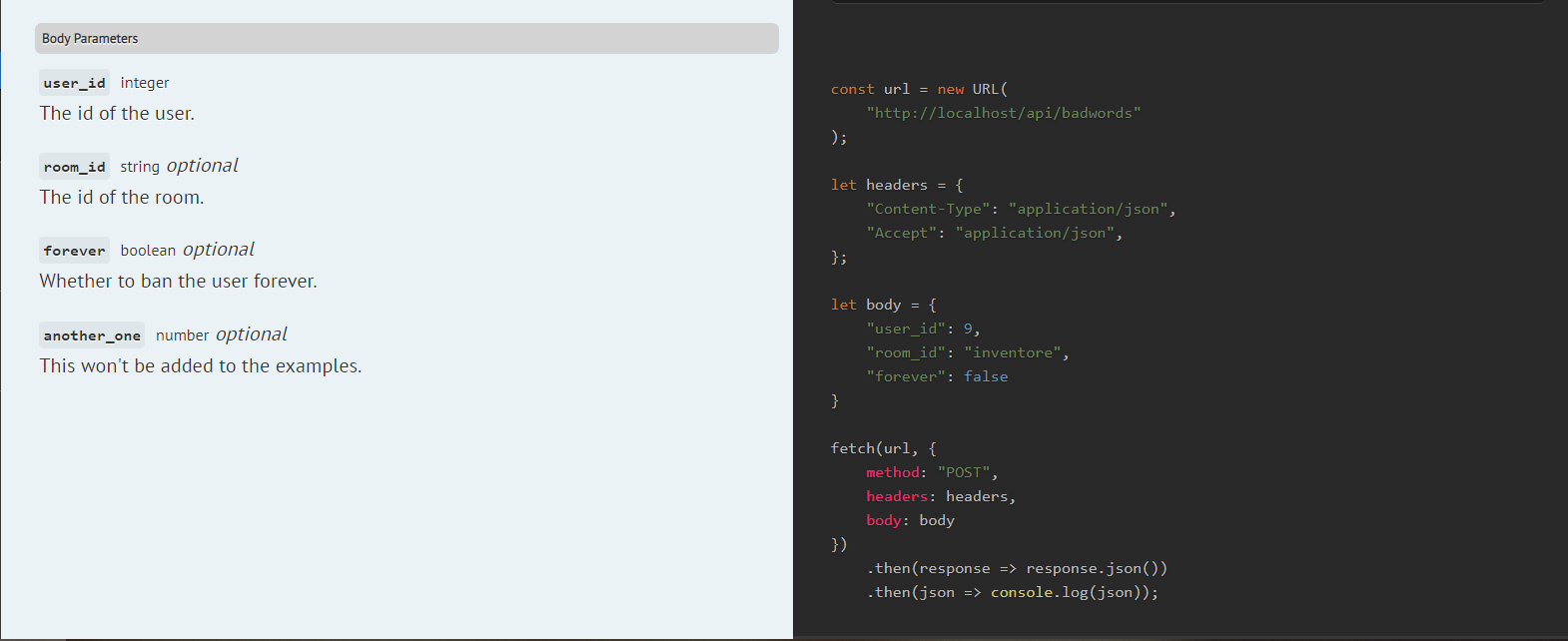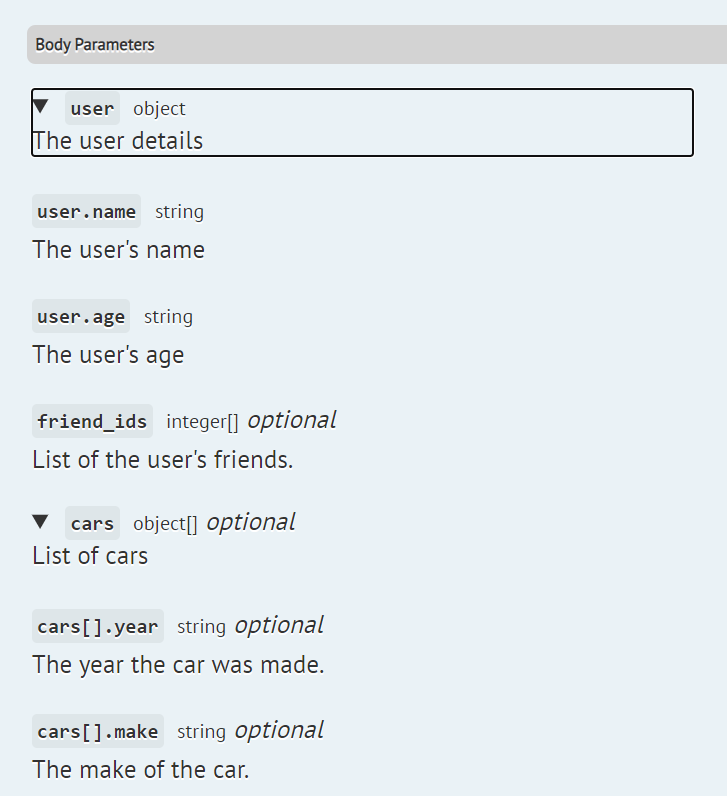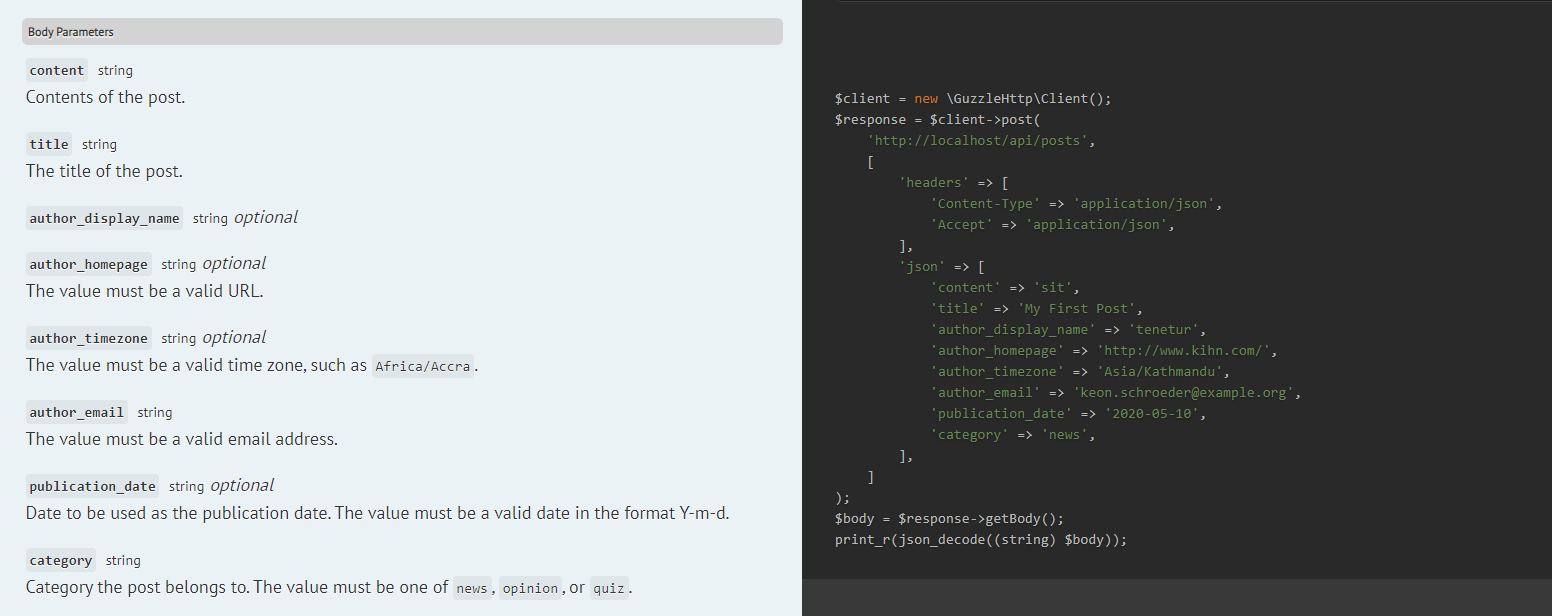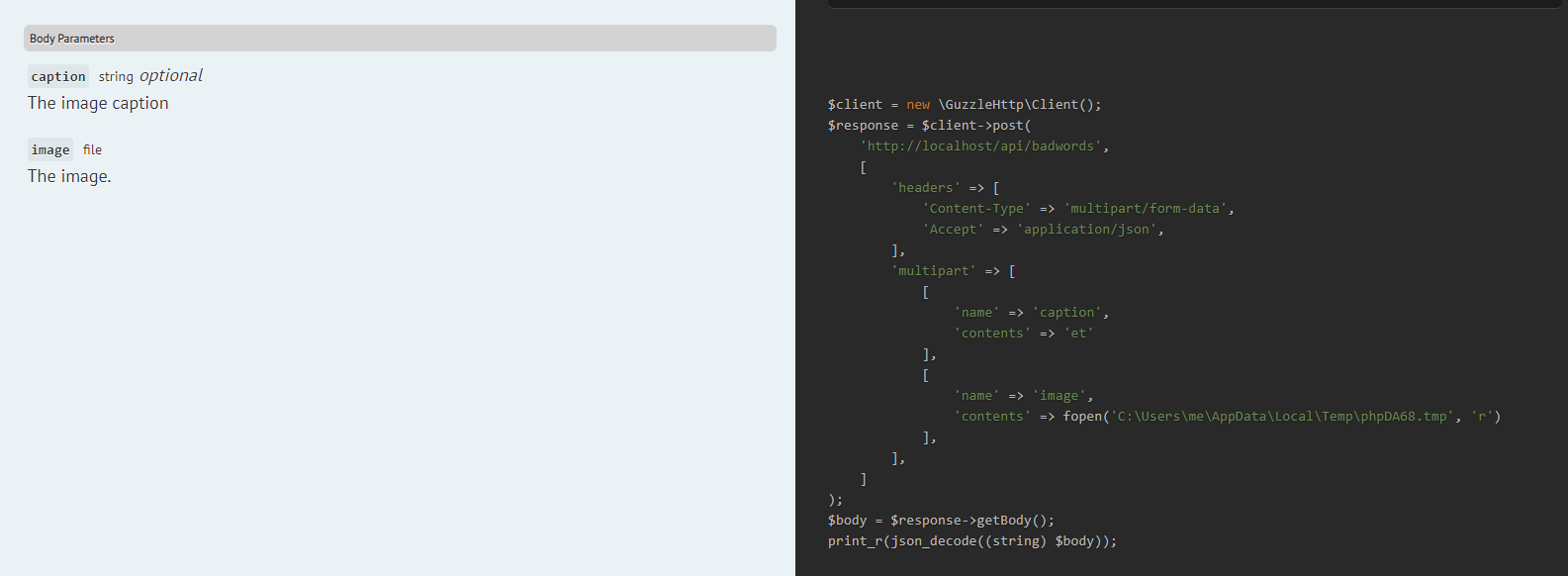Documenting body and file parameters for an endpoint¶
Attention
These docs are for Scribe v2, which is no longer maintained. See scribe.knuckles.wtf/laravel for Scribe v3.
Scribe can get information about your endpoint’s body parameters in two ways:
- the fully-manual way (using the
@bodyParamannotation) - the mostly-automatic way (using FormRequests)
The manual way: Specifying body parameters with @bodyParam¶
To describe body parameters for your endpoint, use the @bodyParam annotation on the method handling it.
The @bodyParam annotation takes the name of the parameter, its type, an optional “required” label, and then its description. Valid types:
stringintegernumberbooleanobject(see Handling array and object parameters below)file(see Documenting File Uploads below)
You can append [] at the end of a type any number of times to indicate an array field (integer[] = array of integers).
By default, Scribe will generate a random value for each parameter, to be used in the example requests and response calls. If you’d like to use a specific example value, you can do so by adding Example: your-example-here to the end of your description.
Tip
You can exclude a particular parameter from the generated examples by ending with No-example instead. The parameter will still be included in the text of the documentation, but it won’t be included in response calls or shown in the example requests.
Here’s an example:
/**
* @bodyParam user_id int required The id of the user. Example: 9
* @bodyParam room_id string The id of the room.
* @bodyParam forever boolean Whether to ban the user forever. Example: false
* @bodyParam another_one number This won't be added to the examples. No-example
*/
public function createPost()
{
// ...
}
The body parameters will be included in the generated documentation text and example requests:

If you’re using a FormRequest in your controller, you can also add the @bodyParam annotation there instead, and Scribe will fetch it.
/**
* @bodyParam title string The title of the post.
* @bodyParam body string required The content of the post.
*/
class CreatePostRequest extends \Illuminate\Foundation\Http\FormRequest
{
}
// in your controller...
public function createPost(CreatePostRequest $request)
{
// ...
}
Handling array and object parameters¶
Sometimes you have body parameters that are arrays or objects. To handle them in @bodyparam, Scribe follows this convention:
For arrays: use a single field with type
<type of items>[]. For instance, to denote an arraycarsof elements of typeinteger:@bodyParam cars integer[]
For objects: you need a parent field with type
objectand an entry for each field, named with the dot notation<parent name>.<field>. For instance, to denote an objectcarswith a fieldnameof typestring:@bodyParam cars object @bodyParam cars.name string
For an array of objects, you need a parent field with type
object[], and an entry for each field, named with the dot notation<parent name>[].<field>. For instance, to denote an array of objectscarswith each item having fieldname:@bodyParam cars object[] @bodyParam cars[].name string
Important
For objects and arrays of objects, both lines are required, otherwise you might run into strange errors.
/**
* @bodyParam user object required The user details
* @bodyParam user.name string required The user's name
* @bodyParam user.age string required The user's age
* @bodyParam friend_ids int[] List of the user's friends.
* @bodyParam cars object[] List of cars
* @bodyParam cars[].year string The year the car was made. Example: 1997
* @bodyParam cars[].make string The make of the car. Example: Toyota
*/

Using FormRequests¶
If you’re using Laravel or Dingo FormRequests in your controller method, Scribe can extract information about your parameters from your validation rules. Since these rules only describe validation logic, you can also add a bodyParameters method where you can add a description and example for each parameter.
Not all rules are supported. Here are the supported rules:
requiredboolstringintnumericarrayfiletimezoneemailurlipjsondatedate_formatimagein
Custom rules are not supported. Scribe will ignore any rules it does not support.
For each parameter in rules() it encounters, Scribe will:
- generate an example value that passes all the supported rules.
- generate a description that combines the supported validation rules with any description you specify in
bodyParameters().
Note
If you have rules that are not supported, Scribe’s generated value might not pass their validation checks. You can get around that by manually specifying an example in the bodyParameters() method.
Here’s an example:
class CreatePostRequest extends FormRequest
{
public function rules()
{
return [
'content' => 'string|required|min:100',
'title' => 'string|required|max:400',
'author_display_name' => 'string',
'author_homepage' => 'url',
'author_timezone' => 'timezone',
'author_email' => 'email|required',
'publication_date' => 'date_format:Y-m-d',
'category' => ['in:news,opinion,quiz', 'required'],
];
}
public function bodyParameters()
{
return [
'content' => [
'description' => 'Contents of the post',
],
'title' => [
'description' => 'The title of the post.',
'example' => 'My First Post',
],
'publication_date' => [
'description' => 'Date to be used as the publication date.',
],
'category' => [
'description' => 'Category the post belongs to.',
],
];
}
}
This gives:

Documenting file uploads¶
You can document file inputs by using @bodyParam or FormRequest rules with a type file. You can add a description and example as usual.
For files, your example should be the path to a file that exists on your machine. This path should be absolute or relative to your project directory (but not in the project root). If you don’t specify an example, Scribe will generate a fake file for example requests and response calls.
/**
* @bodyParam caption string The image caption
* @bodyParam image file required The image.
*/

Note
Adding a file parameter will automatically set the ‘Content-Type’ header in example requests and response calls to multipart/form-data.